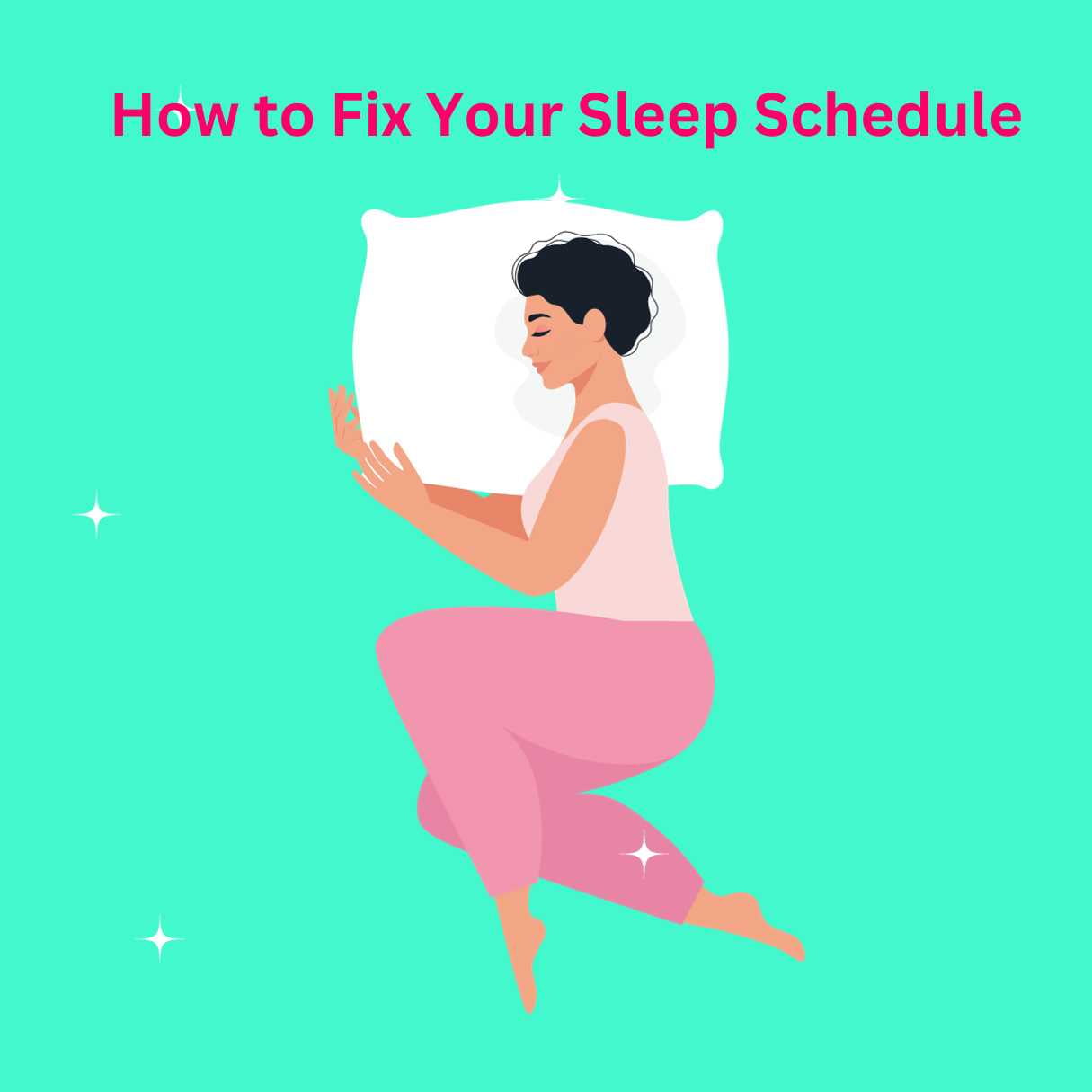How To fix your sleep schedule, develop a sleep routine and avoid napping, as it can interfere with nighttime sleep. Reset your sleep schedule by setting consistent bedtime and wake-up times.
Additionally, pay attention to light exposure, keep your sleeping environment cool, and eat earlier in the evening. Writing down your thoughts before bed can also help clear your mind. Poor sleep hygiene, stress, sleep apnea, or other health conditions may contribute to a disrupted sleep schedule.
Consistency is key when trying to establish a consistent sleep schedule, and it may take time to adjust to a new routine.
Resetting Your Sleep Schedule
Having a consistent sleep schedule is crucial for maintaining good sleep quality and overall health. If you find yourself struggling with irregular sleep patterns, it may be time to reset your sleep schedule. Follow these steps to establish a new routine that allows for a proper night’s rest.
Identify The Need For A Sleep Schedule Reset
Before you can begin resetting your sleep schedule, it’s important to acknowledge the need for a change. Look out for signs such as difficulty falling asleep, waking up groggy, or feeling tired throughout the day. By recognizing these indicators, you can take the necessary steps to reset your sleep routine.
Steps To Reset Your Sleep Schedule
To effectively reset your sleep schedule, follow these steps:
- Determine the Ideal Bedtime and Wake-up Time: Calculate when you want to go to bed and wake up, ensuring you have ample time for a full night’s sleep.
- Gradually Adjust Your Sleep and Wake-up Times: Instead of making sudden changes, shift your bedtime and wake-up time by 15 minutes each day until you reach your desired schedule.
- Avoid Napping During the Day: Even if you feel tired, resist the temptation to nap as it can disrupt your ability to fall asleep at night.
- Manage Exposure to Light: Create a dark and quiet sleeping environment by using curtains or blinds to block out unwanted light, and avoid using electronic devices before bed as they emit blue light, which can interfere with your sleep.
- Maintain a Cool Sleeping Environment: Turn down the temperature in your bedroom to create an ideal sleeping environment, as a cooler room promotes better sleep.
- Adjust Your Eating Schedule: Try to have your meals earlier in the evening, avoiding heavy or spicy foods close to bedtime. This allows your body to digest properly before sleep.
Tips To Help You Stick To Your New Sleep Schedule
Once you have successfully reset your sleep schedule, it’s essential to stick to your new routine to maintain good sleep hygiene. Here are some tips to help you:
- Create a Bedtime Routine: Establishing a consistent pre-sleep routine, such as reading or taking a warm bath, can signal to your body that it’s time to wind down and prepare for sleep.
- Avoid Stimulants: Limit your intake of caffeine, nicotine, and alcohol, as these substances can interfere with your sleep quality.
- Exercise Regularly: Engage in regular physical activity, but avoid intense workouts close to bedtime, as they can increase alertness and make it harder to fall asleep quickly.
- Limit Daytime Napping: If you still feel the need to nap during the day, keep it short (around 20-30 minutes) and avoid napping too close to your bedtime.


Credit: casper.com
Establishing A Consistent Sleep Routine
Learn how to fix your sleep schedule by establishing a consistent sleep routine. Avoid napping during the day, set regular bedtimes and wake-up times, and create a relaxing sleep environment. Resetting your internal clock through light exposure, keeping your room cool, and eating meals early can also help regulate your sleep schedule.
Importance Of Consistent Sleep And Wake-up Times
Establishing a consistent sleep and wake-up schedule is vital for regulating your body’s internal clock, also known as the circadian rhythm. This internal clock determines when you feel awake and alert and when you feel tired and ready for sleep.
Calculating Your Ideal Sleep Duration
It’s important to determine your ideal sleep duration to ensure that you are getting enough restorative sleep each night. The National Sleep Foundation recommends that adults aim for 7-9 hours of sleep per night. You can calculate your sleep duration by experimenting with different sleep durations and assessing how you feel throughout the day.
Creating A Nighttime Routine
A nighttime routine helps signal to your body that it’s time to start winding down and preparing for sleep. Create a relaxing routine that includes activities such as taking a warm bath, reading a book, or engaging in a calming hobby. Avoid using electronic devices before bed as the blue light emitted can disrupt your sleep.
Relaxation Techniques For Better Sleep
Engaging in relaxation techniques before bed can help calm your mind and prepare your body for sleep. Try techniques such as deep breathing exercises, progressive muscle relaxation, or listening to soothing music. Experiment with different techniques to find what works best for you.
Avoiding Stimulating Activities Before Bed
It’s important to avoid engaging in stimulating activities close to bedtime as they can interfere with your ability to fall asleep. This includes activities such as exercising, consuming caffeine or nicotine, and engaging in mentally demanding tasks. Allow yourself at least 2-3 hours of downtime before bed to help your body transition into a relaxed state.
Writing Down Thoughts Before Bedtime
If you find that your mind is racing with thoughts and worries when you lay down to sleep, try writing them down in a journal before bedtime. This can help you mentally offload any concerns and alleviate the tendency to ruminate, allowing your mind to relax and prepare for sleep.
Creating A Sleep-friendly Bedroom Environment
Your sleep environment plays a crucial role in promoting quality sleep. Make sure your bedroom is cool, dark, and quiet. Invest in comfortable bedding, a supportive mattress, and adjust the lighting levels to create the ideal sleep environment. Consider using blackout curtains or a sleep mask if needed.
Establishing A Morning Routine
Just as a nighttime routine helps prepare your body for sleep, having a morning routine can help you wake up feeling refreshed and ready to start the day. Set aside time each morning for activities that bring you joy and help you ease into the day, such as stretching, meditation, or enjoying a nutritious breakfast.
Waking Up Naturally Vs. Using An Alarm Clock
Waking up naturally without the use of an alarm clock can help you maintain a consistent sleep-wake pattern. Try to align your sleep duration with your natural wake-up time to avoid feeling groggy or disoriented upon awakening. If using an alarm clock is necessary, opt for one that simulates natural light or gentle sounds to wake you up gradually.
Incorporating Light Exposure In The Morning
Exposure to natural light during the morning hours helps regulate your internal clock and promotes wakefulness. Open your curtains or go outside for a few minutes to soak up the sunlight. If natural light is not accessible, consider using a light therapy lamp to mimic the effects of sunlight.
Engaging In Physical Activity Upon Waking
Starting your day with physical activity can help boost your energy levels and promote better sleep at night. Engage in activities such as stretching, yoga, or a brisk walk to get your blood flowing and stimulate your body and mind for the day ahead. Choose activities that you enjoy to make your morning routine more enjoyable.
Maintaining A Healthy Sleep Schedule
Learn how to fix your sleep schedule with these simple steps: develop a sleep routine, avoid napping, reset your sleep schedule, control light exposure, keep your sleep environment cool, eat meals early, and maintain a regular sleep schedule. Resetting your body clock can be done by establishing consistent sleep and wake times, and by managing stress and practicing good sleep hygiene.
Identifying Factors That Disturb Your Sleep Schedule
It’s important to identify the factors that disturb your sleep schedule to effectively maintain a healthy routine. Here are some common factors:
- Irregular work hours or shift work
- Electronic devices before bedtime
- Heavy meals or caffeine consumption close to bedtime
- Inconsistent sleep environment
Poor Sleep Hygiene Habits
Poor sleep hygiene habits can disrupt your sleep schedule. Here are a few habits to avoid:
- Irregular sleep and wake-up times
- Napping during the day
- Exposure to bright lights before bed
- Using electronic devices in bed
Stress And Its Impact On Sleep
Stress can significantly impact your sleep schedule. When your mind is filled with worries and anxiety, falling asleep can become difficult. Here’s how stress affects your sleep:
- Increased racing thoughts during nighttime
- Difficulty falling asleep or staying asleep
- Waking up feeling exhausted and unrested
Common Sleep Disorders And Their Effects
Sleep disorders can disrupt your sleep schedule and have a negative impact on your overall well-being. Some common sleep disorders include:
- Insomnia: Characterized by trouble falling asleep or staying asleep
- Sleep Apnea: Breathing disruptions during sleep, leading to frequent awakenings
- Narcolepsy: Excessive daytime sleepiness and sudden sleep attacks
Strategies To Maintain A Healthy Sleep Schedule
To maintain a healthy sleep schedule, consider incorporating the following strategies:
- Practicing good sleep hygiene: Stick to a consistent sleep and wake-up time, create a relaxing bedtime routine, and optimize your sleep environment
- Managing stress and establishing relaxation practices: Engage in stress-reducing activities, such as meditation or deep breathing exercises
- Seeking professional help for sleep disorders: If you suspect you have a sleep disorder, consult a healthcare professional for a proper diagnosis and treatment plan
- Monitoring sleep quality and making adjustments as needed: Keep track of your sleep patterns and make necessary adjustments to improve the quality of your sleep
Tips For Adjusting Sleep Schedule After Night Shifts
Adjusting your sleep schedule after night shifts can be challenging. Here are some tips to help you transition:
- Gradually transitioning to a new sleep schedule: Shift your sleep and wake-up times gradually over several days to allow your body to adjust
- Optimizing sleep environment and creating a bedtime routine: Create a dark, quiet, and comfortable sleep environment, and establish a relaxing bedtime routine
- Managing exposure to light and adjusting meal times: Minimize exposure to bright lights before bed and adjust your meal times to align with your new schedule
Frequently Asked Questions On How To Fix Your Sleep Schedule
How Do I Reset My Body Clock?
To reset your body clock, establish a consistent sleep routine and stick to it. Avoid napping during the day, even if you feel tired. Get exposure to natural light during the day and keep your sleep environment cool. Eat your meals early and maintain regular sleep and wake times.
Avoid stimulating activities before bed, like writing down your thoughts.
Why Is My Sleep Schedule So Bad?
A bad sleep schedule can be caused by poor sleep habits, stress, sleep disorders, or chronic health conditions. To fix it, establish a consistent sleep routine, avoid napping, expose yourself to light, keep your bedroom cool, eat early, and maintain regular sleep and wake times.
Avoiding nighttime distractions and writing down your thoughts before bed can also help.
How Do I Fix My Sleep Schedule After Night Shift?
To fix your sleep schedule after a night shift, follow these steps: establish a sleep routine, avoid napping, expose yourself to light during the day, keep your sleep environment cool, eat your meals early, and maintain a regular sleep schedule.
Resetting your body clock can take time, so be patient and consistent with these habits.
How Do I Make My Sleep Schedule Consistent?
To make your sleep schedule consistent, develop a sleep routine and stick to it. Avoid napping during the day, as it can disrupt your sleep at night. Maintain regular sleep and wake times, even on weekends. Create a conducive sleep environment by keeping it cool and dark.
Limit exposure to bright lights before bedtime. Finally, avoid eating heavy meals close to bedtime.
Conclusion
To fix your sleep schedule and avoid sleepless nights, it’s important to establish a consistent sleep routine. Choose a bedtime and wake-up time that you can stick with, allowing ample time for rest. Avoid napping during the day, as it can interfere with nighttime sleep.
Additionally, managing light exposure, keeping your sleeping environment cool, eating early, and maintaining regular sleep and wake times can help reset your internal sleep clock. By following these tips, you can optimize your sleep schedule and enjoy better sleep quality.

